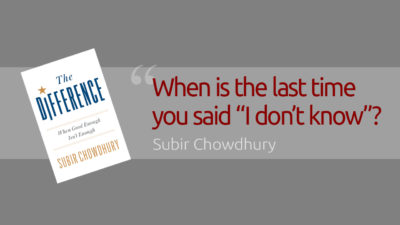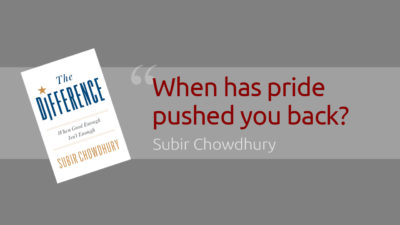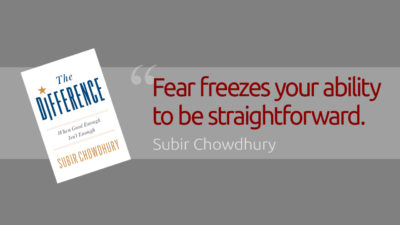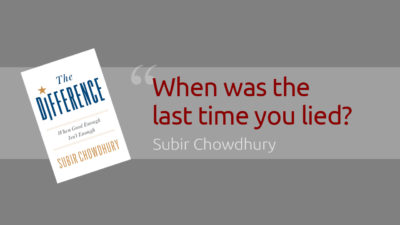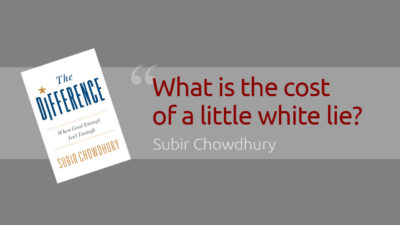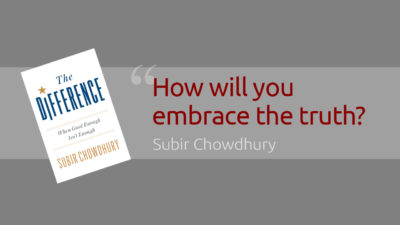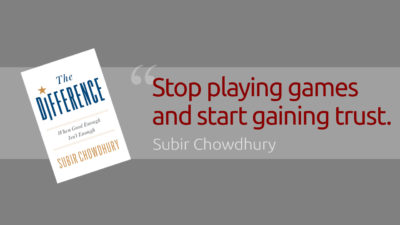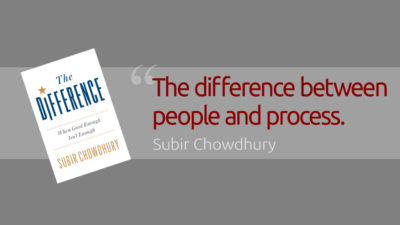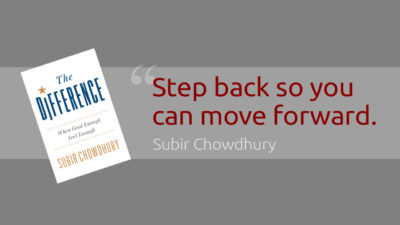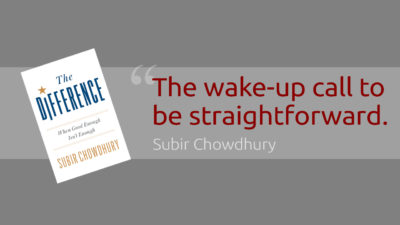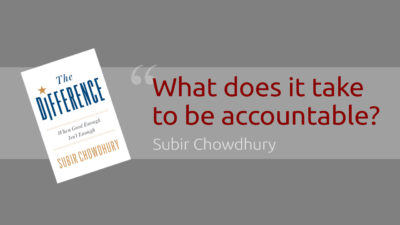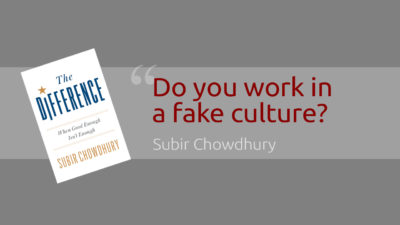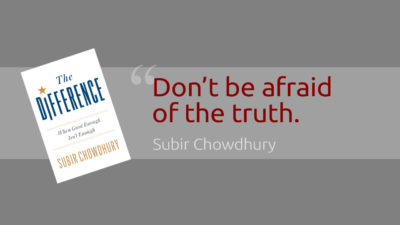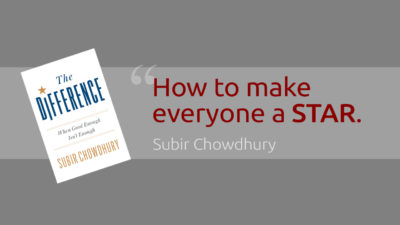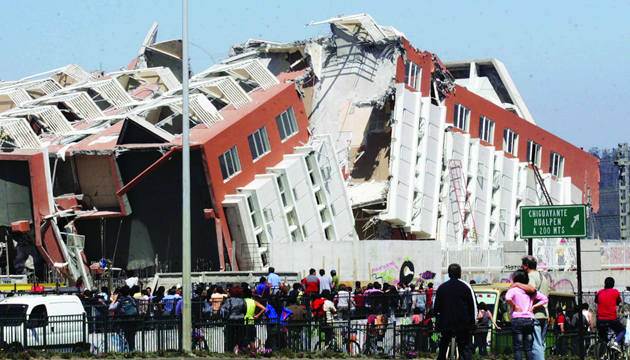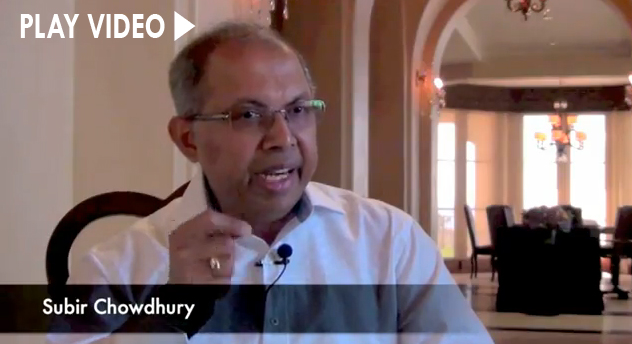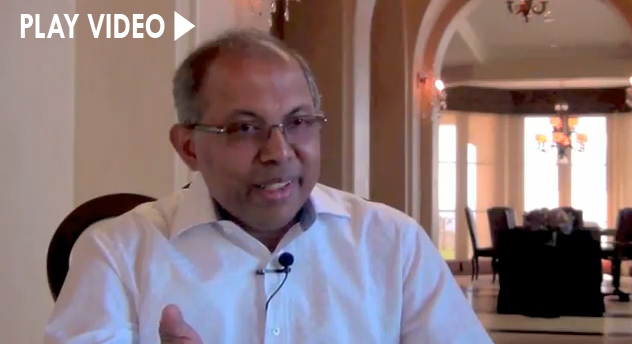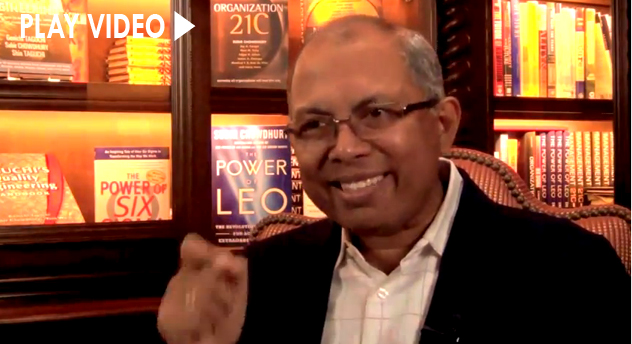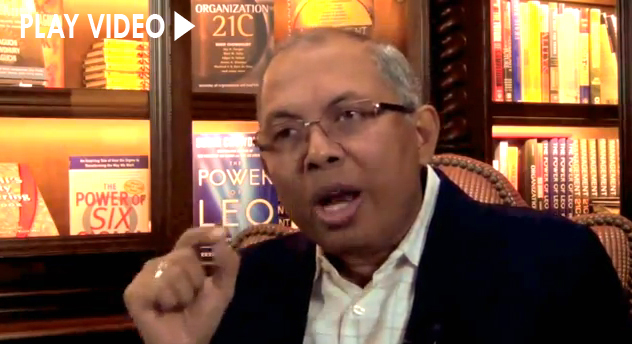Quality & Me
Making Choices
Subir reflects on his arrival into the United States with the promise of a job, only to find that the promise is broken. Practically penniless, Subir searches deep into his soul. Undefeated and undeterred, Subir pursues professors and department heads until he meets one who asks: You went to 20 departments, and now it is the 21st one; if I say no to you what you would do? Subir tells him, "I will go to the 22nd." This is Subir's story, not of conquest, but of perseverance in the face of making difficult choices.
When is the last time you said. “I don’t know”?
Being straightforward means you know when to speak up even if you don’t have the answer. When I admit I don’t know something, it doesn’t mean I can’t learn or solve a problem. In fact, I generally work harder when I don’t know something than when I do.
When has pride pushed you back?
Pride exists at the organizational level and can just as easily become tainted. Think about it. How many times have you witnessed senior level executives not acknowledging a problem? The reason? Pride. Ego. They don’t want to admit that there is a problem because of ego: someone else will think they’re weak, or that they’ll lose face. To admit your decision was wrong means you are weak, correct? Absolutely the opposite!
Fear freezes your ability to be straightforward
When we are scared, nervous, or afraid, we shut out the outside world. We become less open and transparent. Instead of accepting our true selves, and admitting that we are afraid, we put up a wall designed to keep out the truth. We make things up to compensate—about how good-looking we are, about how clever or competent we believe ourselves to be, about how much money we make. We lose sight of the importance of being straightforward and honest. Fear can undermine openness and honesty in anyone—including me!
When was the last time you lied?
None of us grows up and then suddenly starts lying. We develop a tendency toward telling fibs – and outward lies – at early age.
What is the cost of a little white lie?
We have all lied at some point in our lives, even if it’s one of those “little white lies” you told your mother. The thing is, lying is never acceptable. Unless and until you replace lying with being straightforward, you’ll never have a caring mindset.
How will you embrace the truth?
A friend communicated a story to me about Alan Mulally, the former CEO of Ford. When Mulally first joined the organization, he gathered his senior management team together to identify what needed to change at Ford. In a nutshell, Mulally asked his team to color code their initiatives red, yellow, or green. Red meant things were in bad shape—for example, a launch date might be missed. Yellow meant an initiative wasn’t going well, and green meant the initiative was on track.
Stop playing games and start gaining trust
A caring mindset is critical to your success, and the success of your organization. And it starts with being straightforward. Being straightforward means you can be tough and exacting, but also honest, direct, candid, transparent, and fair. Sounds like common sense, doesn’t it? Not always. Let me share a story with you.
The difference between process and people
Part of having a caring mindset is being thoughtful. And you can’t be thoughtful if you’re overextended or overcommitted. When I need to recharge my batteries, I usually go for a long walk. Sometimes by myself, sometimes with one of my kids. I always end up feeling refreshed and reenergized when I return.
Step back so you can move forward
When I need to recharge my batteries, I usually go for a long walk. Sometimes by myself, sometimes with one of my kids. I always end up feeling refreshed and reenergized when I return. It’s critical that you’re passionate about what you do—otherwise, what’s the point? However, there’s a difference between passion and obsession. Let me explain.
Have you gotten the “Wake-up” call to be straightforward?
A director I was consulting with always expected people to come to him. This guy really believed that no news was good news. Like a lot of senior level executives, he expected people to come to him, not vice versa. The problem was, no news wasn’t good news—it was the opposite. Problems weren’t getting resolved.
What does it take to be accountable?
Accountability is taking responsibility for your actions. It’s the “A” in STAR, and acronym I developed for what it takes to have a caring mindset. But first, we need to take a step back. You can’t be accountable if you don’t know what’s going on.
Do you work in a fake culture?
If you are not being true to yourself in all aspects of your life, you’re living in a fake culture. As a leader, a fake culture makes it impossible to develop a caring mindset. Without a caring mindset, you’ll never make a difference, or be the difference.
Don’t be afraid of the truth
Encourage everyone – and I mean everyone – to be straightforward, to tell the truth, and to not be afraid. Without being straightforward, you can never make a difference.
How to make everyone a S.T.A.R.
One company had a return that equaled 5 times the cost of their investment in the program. Another company had a return that equaled 100 times the cost of their investment! It’s a true story. I know, because both companies were clients of my firm. Both companies got a return on their investment, but I still felt both frustrated and perplexed that one had done so much better. The reason for the difference kept puzzling me—why would one company do so much better using the same processes?
Quality & Economics
Data, Action, and Future
When I talk about “honesty” in the context of quality, people often mistake my intent. I am not implying that people are dishonest. I am not saying that people do not know right from wrong. The kind of honesty I’m referring to is the kind that helps you avoid mistakes in your business—the type of honesty that pushes good data, good actions, and a positive future.
Where has your talent gone?
The Challenger space shuttle disintegrated in mid-air, killing all seven astronauts. It was later found that a $900 O-ring was to blame. Years later, the Space Shuttle Columbia was torn apart during re-entry. This time, it was “unexpected consequences” of large chunks of ice that hit delicate wing parts during launch.
Whose political crisis is this, anyhow?
I am deeply troubled by the increased pace of self-inflicted crises in our government and economy. We have been witness to one event after another during the last several years, each with seemingly greater levels of consequence and damage. Not surprisingly, this is all happening under the watchful eyes of two of the least productive congressional sessions in history.
A Moment of Truth for the Solar Panel Industry
I recently read a commentary in the New York Times (“Solar Industry Anxious Over Defective Panels”; May 25, 2013, link), and something sounded familiar. Solar panels that are expected to have a 25-year life span are failing. Coatings are disintegrating and other defects have caused fires. Worldwide, the reports are coming in. The $77 billion solar photovoltaic industry is facing a quality crisis.
A Tale of Two Countries
Is it culture, the weather, geography? Perhaps ignorance of what the right policies are? Simply, no. None of these factors is either definitive or destiny. Otherwise, how to explain why Botswana has become one of the fastest growing countries in the world, while other African nations, such as Zimbabwe, the Congo, and Sierra Leone, are mired in poverty and violence?
Cutting Corners
Is it culture, the weather, geography? Perhaps ignorance of what the right policies are? Simply, no. None of these factors is either definitive or destiny. Otherwise, how to explain why Botswana has become one of the fastest growing countries in the world, while other African nations, such as Zimbabwe, the Congo, and Sierra Leone, are mired in poverty and violence?
A Little Salmonella May Not Kill You, but it May Kill your Economy
After salmonella was discovered in a flavor-enhancing ingredient, a wide range of processed foods were recalled including soups, snack foods, dips and dressings, the result of poor quality control. Food and Drug Administration officials noted that the ingredient, hydrolyzed vegetable protein, was used in thousands of food products. The FDA and the Centers for Disease Control and Prevention said no illnesses or deaths have been reported - so far.
Subir Chowdhury Fellowship on Quality and Economics at Harvard University
Expanding the outreach of Subir Chowdhury's global call for quality throughout society - at all levels - a Fellowship on Quality and Economics has been established at Harvard University Graduate School of Arts and Sciences. The goal: to explore the impact of quality and economics in the United States.
Subir Chowdhury Fellowship on Quality and Economics at the London School of Economics (LSE)
The Subir Chowdhury Fellowship on Quality and Economics allows for any post-doctoral scholar in-residence to participate in the program, regardless of ethnicity or national origin and spend time at LSE engaging in research examining the impact of “people quality” and behavior on the economies of Asian nations prioritizing, but not restricted to, India and Bangladesh.
Quality & Process
Elements of People Power
It’s interesting that so many companies focus on processes without input from customers or even their own employees: ‘top-down’ processes punctuated by statistical data and quality management controls. While it’s obviously important to focus on what goes on behind the scenes, what kind of quality can you possibly deliver without feedback from the people who actually create (employees) or use your products (customers)?
Ideas into Action
It’s one thing to inspire people to come up with ideas to improve the level of quality in your organization. It’s yet another thing to encourage those same people to turn their ideas into action.
Inspiring Talent
There has been a lot of media coverage about enormous salaries paid to top executives, including their mind-boggling “golden parachutes”. Primarily CEOs, these executives aren’t always paid based on their talents.
Power Up Talent
An executive from a company that makes electronic components complained to me that her workforce lacked the talent to move quality beyond the organization’s current level.
Activate the Revolution
In some respects, the old way of managing the quality process is part of the problem. Perhaps it is more accurate to say that the old approach to management has become problematic. When we manage quality, we are addressing problems as we become aware of them. But by then we are already behind; we're reacting and not 'proacting' - we're most definitely failing to prevent anything.
How to Fix a Broken Chain
I was visiting a friend of mine who at the time was the chief executive officer of a large consumer products company. Although we had spent many months prior to my visit discussing quality problems that the company was experiencing, he was reluctant to even talk about it now that we were sitting face to face in his office.
The Quality Process Revolution
For years now, I have been observing organizations just to see what makes their operations rise above the rest and make them what I call “excellent organizations.” What I discovered is more common sense than it is groundbreaking.
Optimize for Perfection
An executive once emailed me a quote that reads: perfection is unknowable. I’m sure his source was Confucius or Zen teaching, but I also find this thought noted in Western cultures as well.
Meet Your Future
Change is everywhere. In nature, change is an undeniable force. Even mountains succumb to the ever present, never diminishing force of change.
The Wisdom of Listening
Even big and successful companies sometimes forget the importance of listening. Let’s face it. Problems come and go, but it’s how we deal with the problems that make us stand out to our customer base.
Watch Your Flow, Keep Control
When I watch organizations, I am reminded of a swiftly flowing river. Starting with raw materials at the river’s source and ending with finished products or services flowing from its mouth, overlaying processes flow into and onto one another. When everything is running smoothly, it is a wonderful thing to behold.
Combating Fires
No matter where they occur, a fire can be a devastating event. When they happen around where we live, we rush to the location with manpower and equipment to extinguish the flames.
Fire, Flow, Future
From the very beginning of my work, I kept a journal of challenges and crisis that were reported to me by my clients. I recorded problems, noted characteristics, and key patterns in each of them. My goal was to record how the different situations were related and how problems were eventually resolved.
Enrich the Process
I was at a gas station and saw a sign that claimed that the fuel was “enriched” with a chemical additive that would make my car run cleaner and more efficiently. My wife bought food that was also enriched, fortified with vitamins and minerals that added nutritional value.
Walking and Talking Quality
Is it culture, the weather, geography? Perhaps ignorance of what the right policies are? Simply, no. None of these factors is either definitive or destiny. Otherwise, how to explain why Botswana has become one of the fastest growing countries in the world, while other African nations, such as Zimbabwe, the Congo, and Sierra Leone, are mired in poverty and violence?
Quality & You
Empathy for Quality
To have empathy for someone means you are putting yourself in a position to feel what that person is feeling. The world could use a great deal more empathy. It’s easy to see that we could decrease disputes and disagreements by being more empathetic, and we’d quickly clear up misunderstandings and misconceptions. Taking it one step further, empathy becomes strategic as new channels of data open to us.
Empowering People Power
Several years ago, in an article entitled “In Pursuit of Excellence” for Personal Excellence magazine, Michael Jordan said that he always had the ultimate goal of being the best. “I approached everything step-by-step, using short-term goals. When I met one goal, I set another reasonable, manageable goal that I could achieve if I worked hard enough.”
The Quality Habit
Did you know that people have been trying to define “quality” for more than a thousand years? I found one of the earliest attempts by the Greek philosopher Aristotle from his text the “Nicomachean Ethics.”
Resistance to Compromise
In the food profession, Chantal Coady is a superstar. How did she get there? Chantel was never satisfied with anything until it was perfect—good enough was never enough. She was always passionate about chocolate, even as a child. When she was old enough to work, Chantel took a part-time job in the chocolate department at Harrod’s, the famous department store in London.
Abolish your Quality Department
For decades now, we’ve made the Quality Department the epicenter of our quality policy. But has this attention been misplaced? My contention is that the reason we have failed to deliver resilient and sustainable quality from American businesses is that we are too focused on the metric of quality. We have turned a qualitative question into a quantitative one, and that simply will not work.
Four Cornerstones for Change
Do you want to change your organization - to transform the rank and file members so that they WANT to achieve true Quality? Of course you do - who doesn't.
LEO Revisited: The benefits of “Listen, Enrich, Optimize”
I have mentioned “Listen, Enrich and Optimize” in previous articles and I'll probably mention them again. They are the main principles of my LEO methodology and they are integral to "Quality is Everyone’s Business” (QIEB) philosophy. We use QIEB to ensure that everyone in the organization is driving toward the same goal of Quality. LEO helps ensure that this transformation is sustainable.
What does your mission statement say about quality?
In this bestselling book, Chowdhury introduced his next-generation management system — LEO. In The Power of LEO, he describes how continuous focus on quality improvement can revolutionize any process—from manufacturing operations to managerial decision making. The secret is to cease delegating the responsibility of quality to specific teams or departments and permanently lodge it within the core of an organization’s culture.
Quality is Everyone’s Business
The word "Quality" should mean more than a management tool that measures output of a company - and it can, if only we tap into the power of people to do the best that they can do – all of the time. Rather than see quality as a management process, I see it as a lifestyle choice - an underlying motive to work toward personal excellence.
Are you driven by the culture of “Good Enough”?
Every day, we are faced with choices: a choice to do right or do wrong; a choice to do or do nothing; a choice to bear down and do the right thing or do the minimum that's required to get the job done.
Redefine the Nature of Quality
While it is true that I am advancing a new way to think about quality, I am also reaching beyond common output metrics of a product or service. I believe that we need a fresh approach that can have a profound effect on not only the way we work, but the way we perceive our everyday life.
Transform Your Organization through Quality
I use word “quality” as a proper noun; quality with a capital “Q”; because the effect of quality should not be limited to a policy or a set of rules. When Quality becomes everyone’s business, we see the outline for a truly transformational experience that shakes the very foundation of our beliefs and behaviors.
Make Quality a Lifestyle Choice
A few years ago, a colleague of mine was driving his car and hit a big pothole in the road. He stopped the car to make sure everything was okay. The car was fine, but at some point, he must have dropped his wallet, because when he got home he couldn’t find it. Sure, he had some money and credit cards in there, but he said that he also had some pictures of his family, and was devastated to think that he’d never get them back.
What does Quality mean to You?
When I ask people, “what does Quality mean to you?” I hear a wide range of answers. For some people, their answer is, “Quality means putting out the best product or service possible.” Others may say, “Honesty and trust.” Many will tell you, “Quality means doing the right thing at the right time.” Still others will say, “Quality is a resistance to compromise.” However, more often than not, I still hear “ I have no idea, that’s why we have a quality department,” or “Hey let me ask my Vice President of Quality,” or even worse yet, “I’m not sure what quality means to me.”





